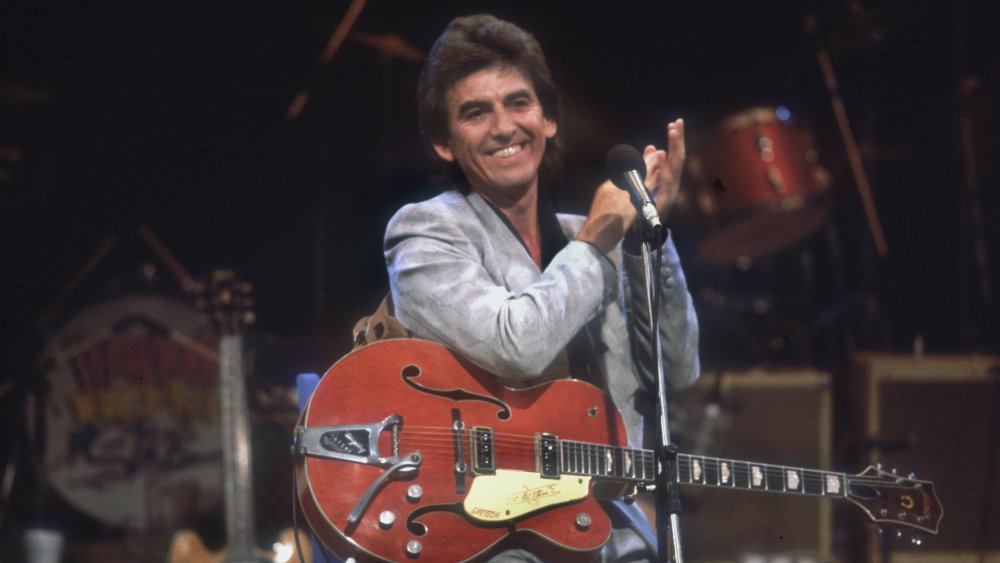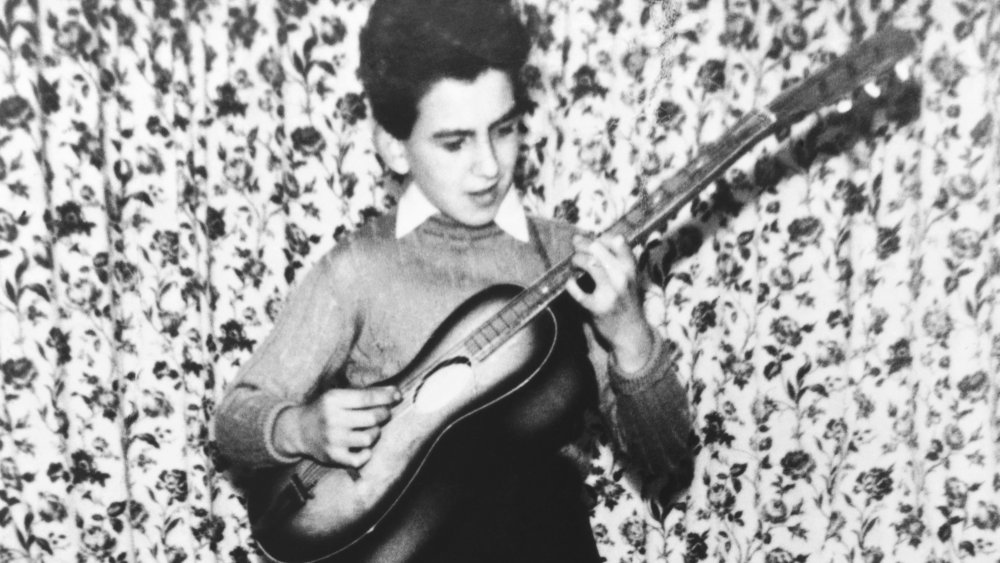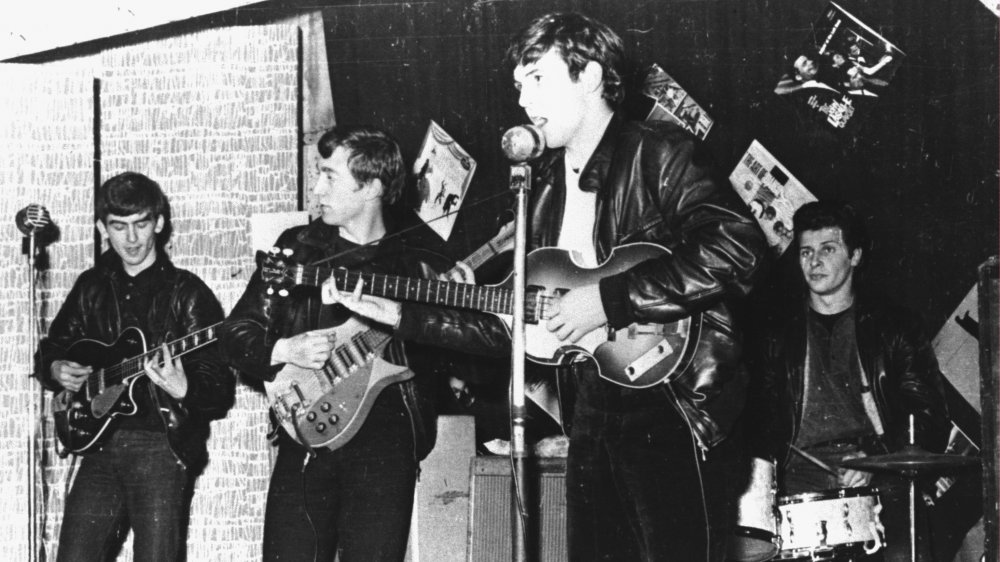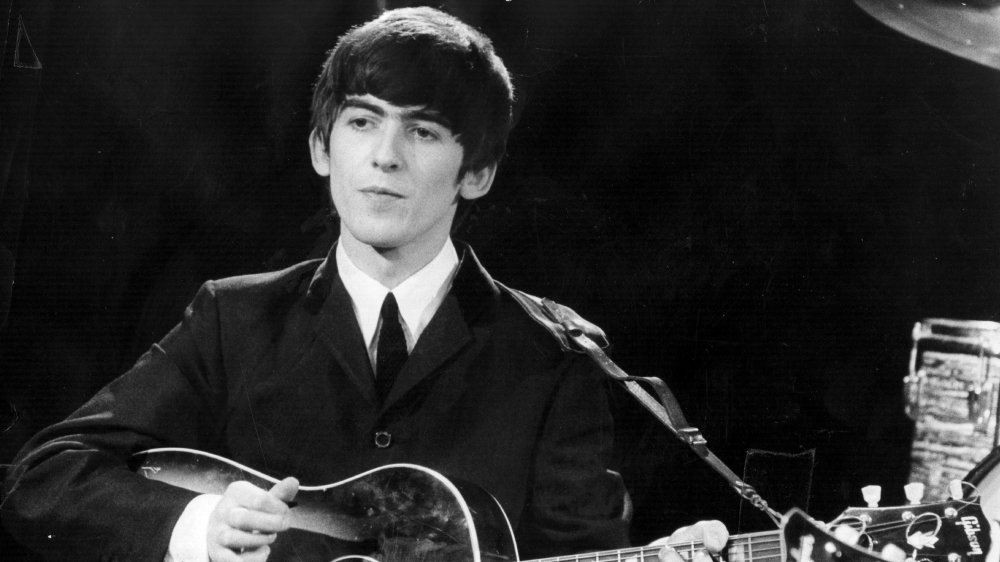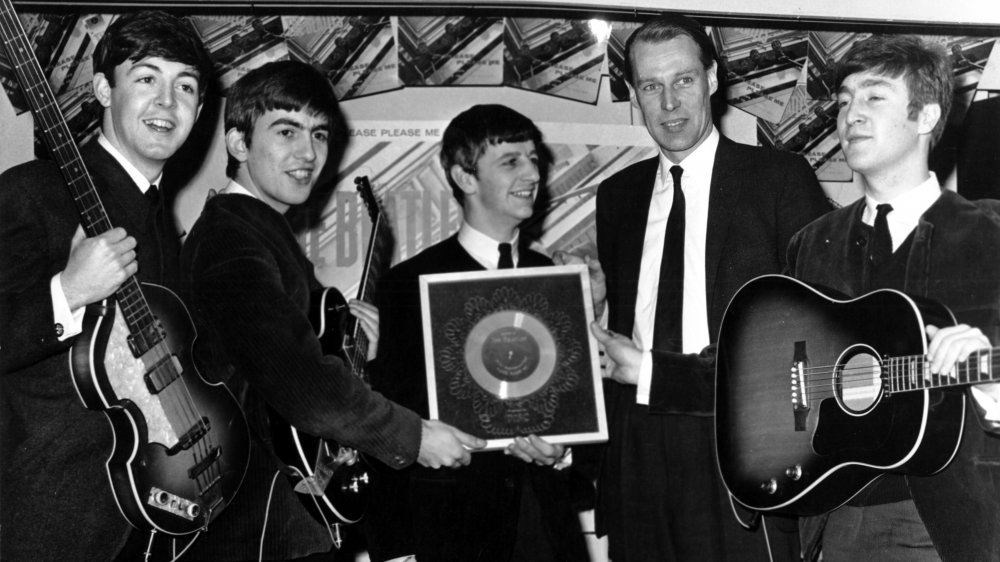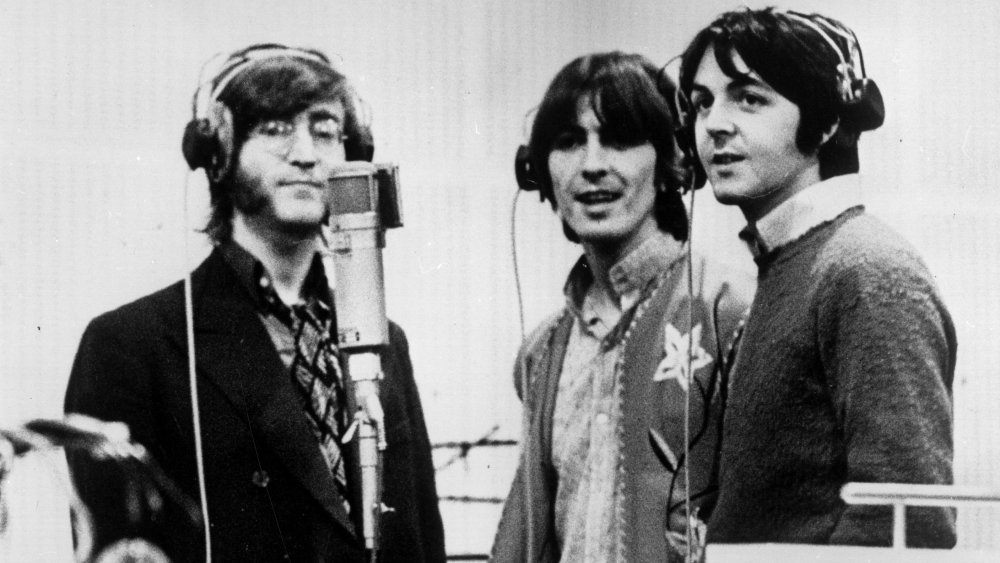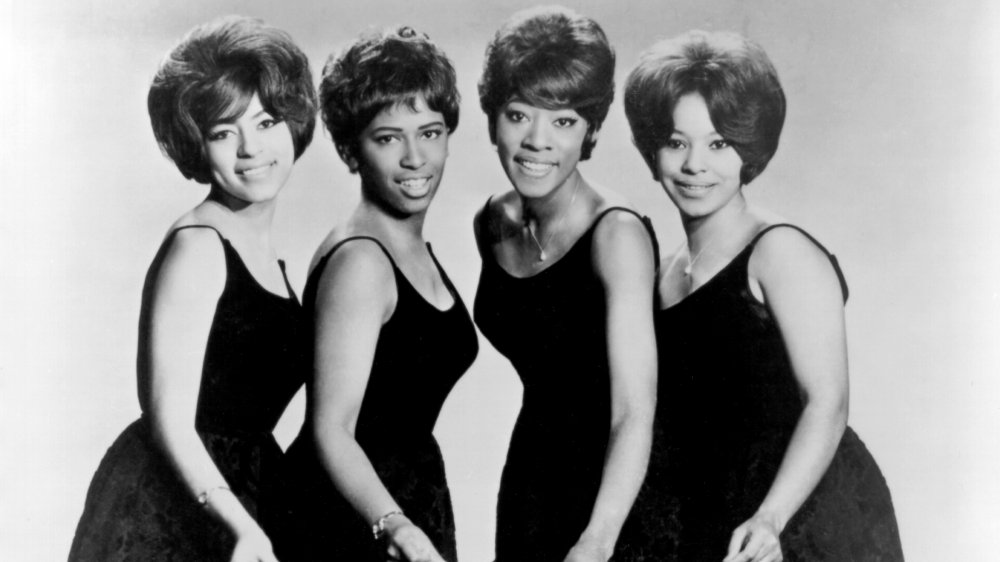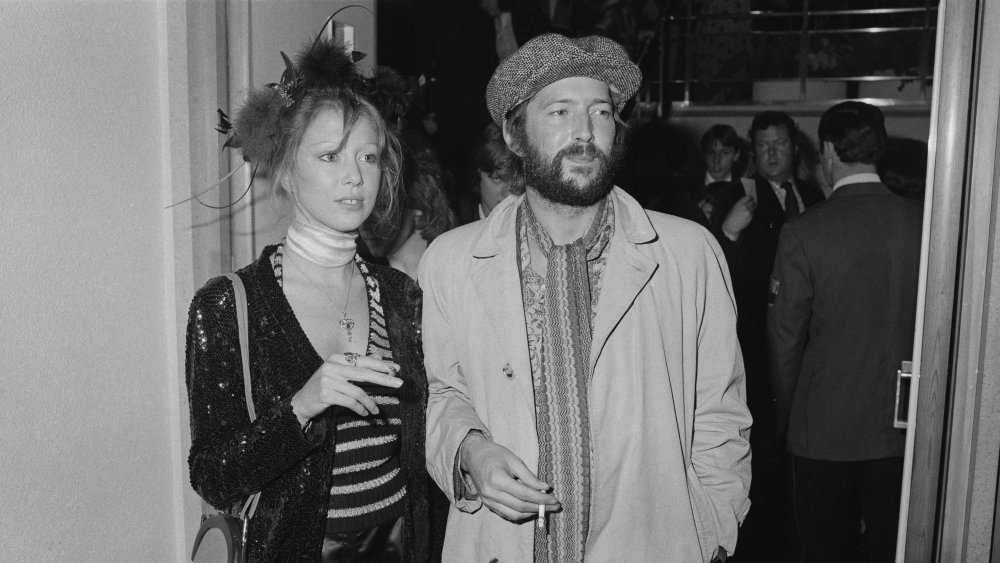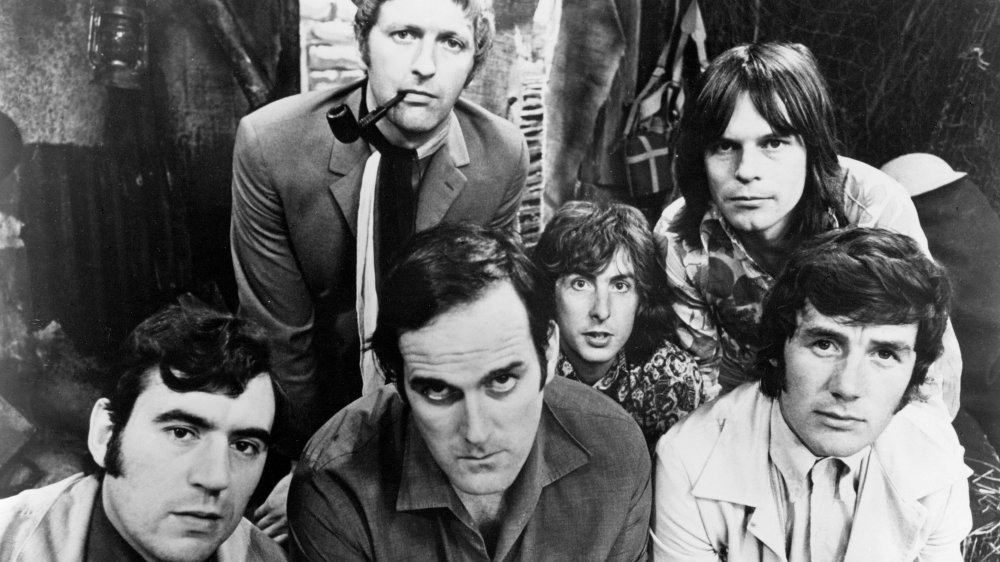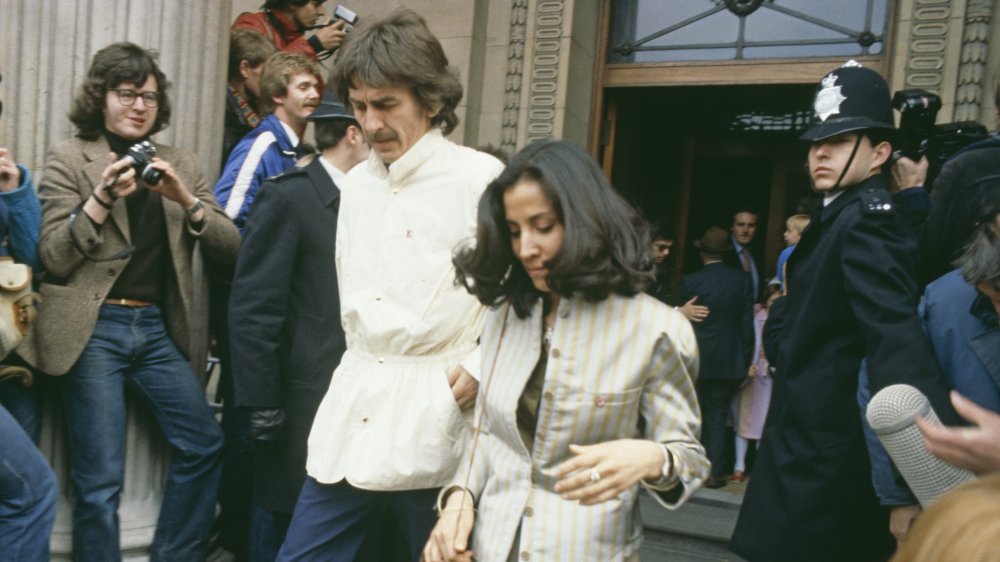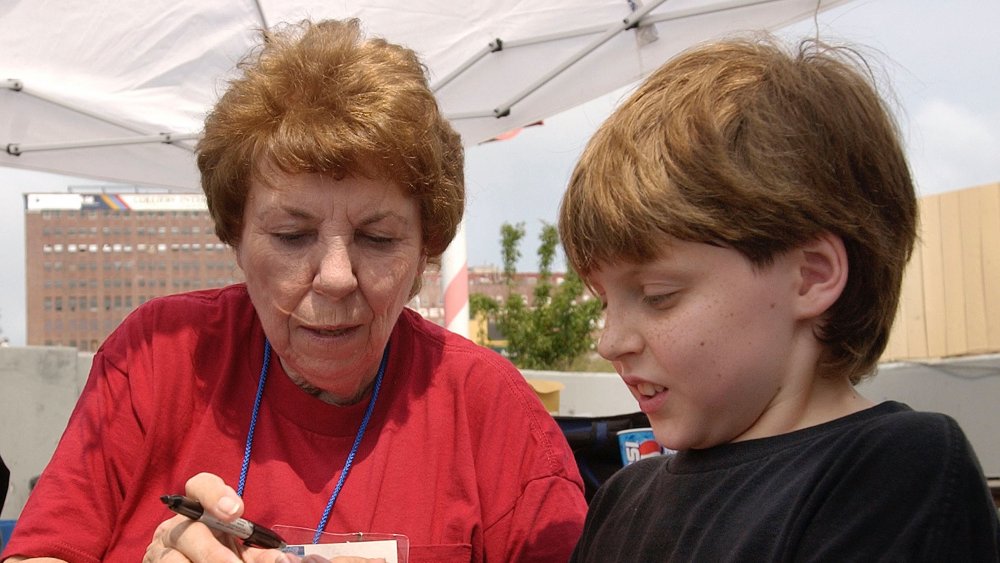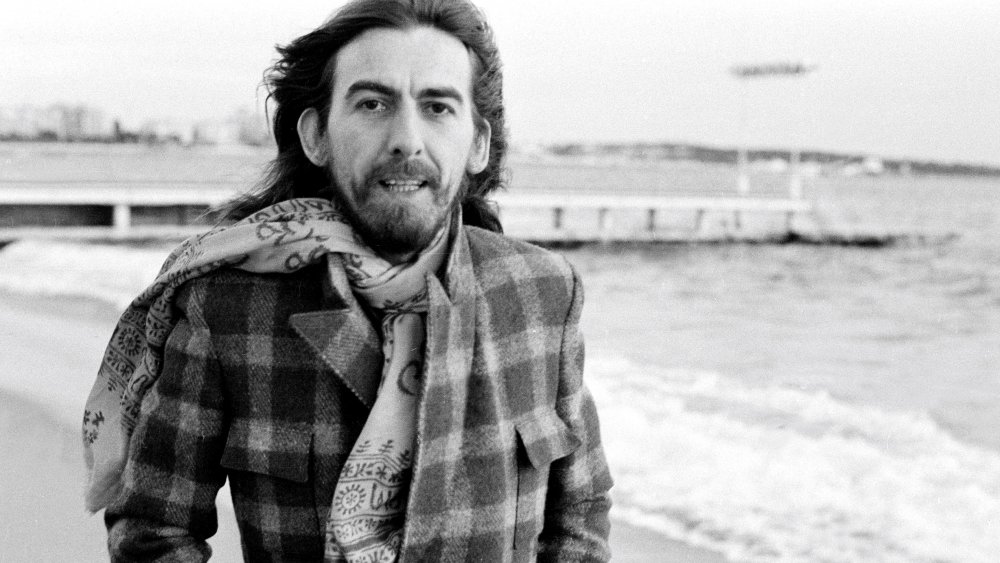The Tragic Real-Life Story Of George Harrison
George Harrison may have been "the quiet one," but as lead guitarist for the Beatles and, later on, a hit-making songwriter, his impact on music was profound. On Rolling Stone's list of the 100 Greatest Guitarists, singer/songwriter Tom Petty spoke of Harrison's musicianship: "He just had a way of getting right to the business, of finding the right thing to play. That was part of that Beatles magic ... He was a guy who could just add so much."
By the time that the Beatles broke up, Harrison was only 27 years old and spent the next three decades of his life as a successful and innovative solo musician and a member of the supergroup, The Traveling Wilburys, alongside Petty, Bob Dylan, Jeff Lynne, and Roy Orbison.
As explained by the National Catholic Reporter, Harrison's fascination with Indian culture brought sitar lines into Western music and Hindu influence into his songwriting and personal life. His time as a film producer helped make some of the most influential films of the 1980s.
That being said, not everything George Harrison touched turned to gold. His 58 years of life were filled with broken relationships, anxiety about his privacy, and a struggle to prove himself as a solo artist. Here is the tragic real-life story of George Harrison.
George Harrison grew up poor
By the time of his death in 2001, George Harrison had a net worth of $400 million, according to Celebrity Net Worth. The 58-year-old man from Liverpool had come a long way financially since his childhood. Harrison, along with the rest of his future bandmates, did not grow up in a place of wealth and comfort in post-WWII England.
George Harrison was born on February 25, 1943 in Wavertree, Liverpool. In his 1980 autobiography, I, Me, Mine, Harrison described the home he grew up in during the first years of his life. According to Harrison, the home was "OK in its own period." Each room on the downstairs was only 10 feet by 10 feet and during the winter, the home would get terribly cold. Young Harrison used an outdoor toilet and managed without hot running water indoors.
Harrison was the youngest of four children to Harold and Louise Harrison. According to Barry Miles' book, The Beatles Diary Volume 1: The Beatles Year, in 1949, the family moved to a new home on 25 Upton Green, Speke, a council house (which is a form of public housing in England). In 1954, though a far bus ride away, Harrison started to attend the Liverpool Institute. Though he said it took a while to get home, it was on one of these bus rides that he met an upperclassman who also lived in the area and the pair sparked a friendship. That upperclassman was none other than Paul McCartney.
George Harrison's age hampered him in The Beatles
On July 6, 1957, a 15-year-old Paul McCartney watched a young, local skiffle band named "The Quarrymen" play, fronted by a soon-to-be 17-year-old John Lennon. The pair's love of music sparked a friendship and musical partnership as McCartney quickly joined the band, as stated in Britannica.
While John Lennon was the clear leader and frontman of the Beatles in their early days, McCartney knew his school friend George Harrison's skills at the guitar surpassed everyone else in the young group. Despite this, according to Biography, there was a major factor that made Lennon hesitate to add Harrison. Harrison was three years Lennon's junior and two years younger than McCartney. Despite this, as McCartney says in the documentary, Living in the Material World, during a bus ride with the three boys, Harrison played a perfect rendition of the song, "Raunchy," which convinced Lennon to put him into the group as the lead guitarist.
This would not be the last time that Harrison's age affected his career, however. According to Ultimate Classic Rock, when the group began to play shows in Hamburg, Germany, they originally performed primarily at two clubs owned by a man named Bruno Koschmider. After a year, the group's popularity soared enough that they were offered more money for another club, at which Koschmider called the authorities and had Harrison deported, as he was only 17 and considered underage to work in Hamburg.
The Silent Beatle moniker came from an illness and his stage presence
As the Beatles' popularity grew, each member earned a nickname: John Lennon was considered the smart one, Paul McCartney was the cute one, and Ringo Starr was the funny one. Harrison earned the title as the "quiet Beatle" and while he never complained about the nickname — even making a joke about it at the group's induction to the Rock and Roll Hall of Fame — people close to him saw it as inaccurate.
The Independent wrote in 2018 that Harrison was an "innovator and a maverick, yet his place in western culture remains under-appreciated." His quiet reputation came in part from his "shyness" and being the youngest Beatle, but also from having to share the stage with his three older bandmates who had louder personalities. On the stage, Harrison usually kept his head down and focused on his guitar playing, leaving the main vocals to Lennon and McCartney. He was quoted as saying, "How do you bring a song and show it to Lennon and McCartney?"
Another reason for the reputation, the New York Post reports, was that when the group arrived in the United States in February 1964, Harrison was suffering from a 104-degree temperature and strep throat, keeping him inside while the rest of the group enjoyed New York City. His sister, Louise Harrison, who cared for Harrison while he was sick, said Harrison's nickname came in part because "he didn't feel like talking much since he was sick."
Harrison was often ignored by producer George Martin
Being a second banana is hard for someone with talent. Ego trips tend to lead to infighting and breakups in bands. So imagine how the talented Harrison felt not to be the second in command, but the third when it came to the Beatles. The dominant force of John Lennon and Paul McCartney led Harrison to be largely limited to only one or two songs per album during the group's tenure.
Longtime Beatles producer George Martin also tended to ignore Harrison's contributions, focusing more on the Lennon/McCartney duo. In a documentary about Harrison, Martin addressed the issue. "George realized what he was up against with both John and Paul, and also me to a certain extent because, I must confess, I would obviously concentrate on the guys giving me the hits," Martin said.
The Beatles producer talked about Harrison's early work being looked down upon when compared to Lennon and McCartney's contributions. "In the beginning, George's work was kind of tolerated 'oh yes, we must have a George song on this thing,' kind of saying 'well it's not going to be as good as the others but we'll let him have it on, which is terribly unfair and I do regret that," Martin claimed.
However, by 1969, according to U Discover Music, Harrison's songwriting had grown to the point that his composition, "Something" for the album Abbey Road was called "the best track on the album" by Lennon.
Harrison's relationships with John Lennon and Paul McCartney were strained
While much has been made about the Lennon/McCartney relationship throughout the years, it was the relationship between the two and George Harrison that at times were the most contemptuous.
During an old Rolling Stone interview, Harrison claimed McCartney did not help his songwriting, Far Out Magazine notes. "My problem was that it would always be very difficult to get in on the act because Paul was very pushy in that respect," George Harrison said. "When he succumbed to playing on one of your tunes, he'd always do good. But you'd have to do 59 of Paul's songs before he'd even listen to one of yours."
Harrison and Lennon's relationship grew during the 60s but deteriorated as Harrison desired to grow as a songwriter and Lennon became more attached to his wife, Yoko Ono. Harrison left the band for a period after a blowup with Lennon in 1969, before returning.
Following the group's split, Harrison and Lennon stayed close and Harrison even played guitar on Lennon's diss track of McCartney, "How Do You Sleep?" Unfortunately, according to Cheat Sheet, the relationship got worse over the decade, and Lennon and Harrison never reconciled before Lennon's murder. Meanwhile, Uncut reported that McCartney saw Harrison less than two weeks before his death and they had a long, friendly conversation. Though Robert Rodriguez states in his book, "Fab Four FAQ 2.0: The Beatles' Solo Years, 1970-1980," the two still had a "volatile relationship" until Harrison's passing.
Harrison was sued for copyright infringement
Finally free from the constraints placed on him as the third option in a group, Harrison launched into the 1970s with the album, "All Things Must Pass." Filled with songs he stockpiled during his final years with the Beatles that he could not get onto their last albums, the album is considered by many as the best solo album by any former Beatle. According to Far Out Magazine, songs such as "Isn't It a Pity" and "Let It Down" were completely ignored and rejected by McCartney and Lennon. Both became tracks on Harrison's third solo album.
One of the many standout tracks on the record was the chart-topping "My Sweet Lord." According to Ultimate Classic Rock, the song was inspired by the hymn "Oh Happy Day" and its version by the Edwin Hawkins Singers. Harrison wrote it in December 1969 and after attempting to give it to his friend Billy Preston, Harrison recorded his hit version himself. However, in February 1971, Bright Tunes Music sued Harrison for copyright infringement, saying the song was too similar to a song under their label, "He's So Fine" by the Chiffons.
The lawsuit was not decided until 1976 when, according to U Discover Music, the judge declared that Harrison had subconsciously used the song and awarded the lawsuit in favor of Bright Tunes Music. One step forward, two steps back as they say.
Harrison's best friend fell in love and married his first wife
On the set of the Beatles' first film, A Hard Day's Night, a 21-year-old George Harrison met a young model named Pattie Boyd. The two began a romantic relationship and married in 1966. One of Harrison's best songs while a Beatle, "Something," was written for Boyd, says The Vintage News. By the end of the decade, however, Harrison's marriage was put on the line by one of his closest friends.
Eric Clapton, like Harrison, had grown tired of his band's infighting and had chosen to go solo by the decade's end. The two began to collaborate in and out of the studio. Clapton played the guitar solo on Harrison's "While My Guitar Gently Weeps" and Harrison co-wrote the song "Badge" on Clapton's band's farewell album. During this same period, Clapton had fallen in love with Pattie Boyd Harrison.
In 1971, Clapton, now the leader of the band Derek and the Dominoes, wrote an entire album about his unrequited love for his best friend's wife, with the title track, "Layla" becoming a rock classic. Boyd said in an interview she "panicked" upon hearing the song. Eventually, Clapton confessed his love for her to Harrison while the three were at a party.
However, because of Harrison's infidelities, Boyd left him in 1974 and began a relationship with Clapton. Despite this, according to Ultimate Classic Rock, Harrison stayed close to the two and attended their wedding in 1979.
Harrison's film company, HandMade Films, went bankrupt
Outside of music, George Harrison became entangled with another iconic group of Brits. Harrison became close friends with the cast of Monty Python, a sketch comedy troupe that has influenced comedians and shows like Saturday Night Live over the decades. Ironically, in a 2013 Atlantic article calls the famous troupe "The Beatles of Comedy."
According to the Guardian, after no production company would produce the group's film that satirized religion, titled, "Life of Brian," Python member Eric Idle called Harrison. After reading the script and talking to his business manager, he established HandMade Films and remortgaged his home to produce the film, which would become a commercial and financial smash hit.
HandMade Films became an important producer for British cinema throughout the 1980s. As Idle put it, "If you looked at the British film industry [in the 1980s] and took HandMade's films out, there would be almost nothing left." According to their website, HandMade Films helped launch the film careers of actors such as Bob Hoskins, Helen Mirren, Richard E. Grant, and Paul McGann.
By the 1990s, however, the popular production studio was on the verge of bankruptcy after a number of financial disappointments at the end of the '80s. According to Flickering Myth, due to growing debt and falling numbers, the company disbanded. Harrison sued his partner Dennis O'Brien for fraud and negligence and won £11 million.
George Harrison and his wife were attacked in their home
Stress brought on by Beatlemania and the murder of his bandmate John Lennon by a deranged fan led Harrison to become very wary of the public. His concern for privacy became justified when a young man broke into his home and attacked him and his second wife in 1999.
On the night of December 30, around 3:30 AM, a 33-year-old man named Michael Abrams broke into Harrison's mansion. According to Ultimate Classic Rock, Harrison confronted the man and attempted to tackle and disarm him, but the man stabbed Harrison in the chest. Harrison's wife, Olivia, disarmed the man by hitting him with a lamp, saving herself and her husband, who had suffered near-fatal wounds in his chest.
Similar to Lennon's assassin, Mark David Chapman, who according to Biography, was diagnosed with schizophrenia, Abrams claimed to have been driven by wild thoughts. Unlike Chapman who plead guilty after much speculation for an insanity defense, Abrams was found not guilty for reason of insanity and spent two years in a mental hospital.
According to Rock and Roll Garage, Harrison, following the attack joked to the press, "[he] wasn't a burglar, and he certainly wasn't auditioning for the Traveling Wilburys." Dhani Harrison, George and Olivia's son, said "it definitely took years off his life" as Harrison at the same time was also fighting throat cancer.
George Harrison had a falling out with his sister
Unfortunately, it was not just his former bandmates that George Harrison drifted apart from later in life. Harrison was very close to his older sister, Louise Harrison, for most of his life. Young Harrison was actually the first to visit the United States six months before the group's Ed Sullivan Show debut to visit her and her American husband in Illinois, U Discover Music reports.
According to the River Front Times, George Harrison started providing his sister a $2,000 monthly stipend beginning in 1980. This came, according to Louise, after two failed marriages with husbands who had alcohol problems. George Harrison told his sister, "Don't go getting married again. There's no reason, given my circumstances, that my sister should have any kind of hardship."
By the early 1990s, however, Louise decided to turn the home where the young George Harrison once stayed into a Beatles themed bed and breakfast. The news that his sister was capitalizing off his Beatles image angered Harrison, though he still continued to pay the stipend. Louise Harrison said that she "never tried to exploit the Beatles."
On his deathbed, the two reconciled. However, after his death, the monthly stipend that Harrison provided his sister stopped. According to Marty Scott, a musician who plays George in Beatles tribute bands and who is close to Louise, Louise had a better relationship with George's first wife, Pattie Boyd, then with Harrison's second wife, Olivia Arias.
George Harrison suffered from throat cancer after years of smoking
While the death of John Lennon was quick and violent, George Harrison went through a slow, painful process as he suffered from the combined effects of throat cancer and a brain tumor. Harrison, a smoker for the majority of his life, blamed the habit for his condition, according to SF Gate.
In 1997, Harrison had been diagnosed with throat cancer and immediately underwent treatment. While initially successful, in May of 2001, Harrison had to enter the Mayo Clinic for treatment — this time for lung cancer. Two months later, Harrison had to undergo radiotherapy for a brain tumor in Switzerland. In his final days, Harrison flew to New York to undergo his final treatments for brain cancer.
According to the Guardian, George Harrison, in bed shortly before his death, still had the energy to crack jokes to Ringo Starr during their last conversation. Starr was on the way to Los Angeles because his daughter was undergoing brain surgery herself. Harrison quipped, "Do you want me to come with you?"
George Harrison passed away on November 29, 2001, in Los Angeles. The New York Times reports that Paul McCartney, after hearing the news, said, "He was a lovely guy and a very brave man and had a wonderful sense of humor. He is really just my baby brother."
